- Get link
- X
- Other Apps
- Get link
- X
- Other Apps
In the shadow of the Russia-Ukraine war, the world is grappling with more than just political turmoil. The war has rippled through global food security, leaving a mark that extends far beyond the borders of the conflict.
Picture this: fields once teeming with golden wheat and corn now bear the scars of war, with large swathes of Ukrainian agricultural land under Russian control or caught in the crossfire. This has led to a significant drop in global wheat exports. Joe Glauber from IFPRI warns of a 7% decrease in wheat exports for 2023/24, as Ukraine, once a major contributor, now struggles to produce only 35%-40% of its pre-war levels.

And here's the twist – climate change has joined forces with geo-political upheaval. India, quick to offer a helping hand in the face of the wheat shortage, found its plans thwarted by unexpected heat waves. Just as Indian Prime Minister Narendra Modi pledged support, export restrictions were enforced, leaving the global wheat market even more strained.
Now, let's zoom in on Ukraine. Antonina Broyaka, a researcher from the heart of the conflict, sheds light on the harsh reality. Ukraine used to feed around 400 million people globally before the war. Now, the damage is staggering – $8.9 billion worth of physical assets destroyed or stolen and another $34.25 billion lost due to reduced productivity. The culprits? A disrupted logistics chain, soaring production costs, and a global market offering lower prices for Ukrainian crops.
Broyaka points a finger at Russia's blockade of Black Sea ports and the unsettling presence of land mines in vital agricultural areas. She doesn't mince words about her fears, expressing concern that even if the war ends this year, it will take until 2030 to reclaim the pre-war acreage for cereals and oilseed crops. Demining the land is a time-consuming process, and the road to restoring production and export levels is a long and arduous one.
The impact is felt not just on Ukrainian soil but resonates globally. The war has left scars on the very breadbaskets that nourish nations. The question now is, how will the world adapt to this new reality of disrupted food chains and scarred landscapes?
Curious to know how EU farmers are weathering this storm? Stay tuned for our next blog. And if the insights above struck a chord with you, join us on our other social media platforms for more thought-provoking content. After all, understanding the intricacies of our world is the first step toward shaping a better future.
- Get link
- X
- Other Apps
Comments
Very detailed article very helpful for someone in this field
ReplyDeleteThank you for your feedback! We're glad you found the article helpful. At Precision Grow, we strive to provide valuable insights for professionals in the field. Stay tuned for more informative content!
Delete